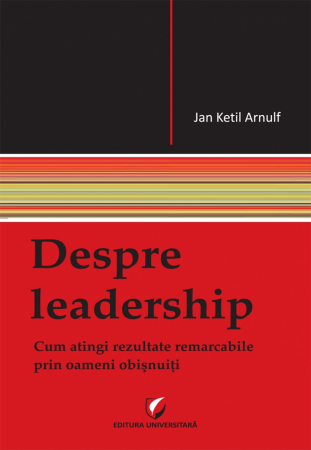Manuscript proposals: [email protected] / 0745 204 115 //// Tracking orders Individuals / Sales: 0745 200 357 / Orders Legal entities: 0721 722 783
Publisher: Editura Universitară
Author: Maria-Cristina Stefan, Diana Paun, Crina Bucur, Maria Dumitriu Caracota, Valentina Zaharia, Mihaela-Mirela Dogaru
ISBN: 978-606-591-569-5
DOI: 10.5682/9786065915695
Publisher year: 2012
Edition: I
Pages: 312
Product Code:
9786065915695
Do you need help?
0745 200 357
- Description
- Authors
- Content
- More details
- Reviews (0)
Management, as a science, has emerged relatively recently, in response to the pressing needs of social practice, through the efforts of a large number of specialists around the world. Management is approached from multiple points of view, which often differ from each other.
North American managers spread pragmatic definitions from the manager's position. Other approaches treat management as a science.
From the examination of the different opinions, results the sensitive content attributed to the management science, each specialist considering only some elements that constitute the object of this science, not indicating sufficiently rigorously its specificity.
In our opinion, the management of companies resides in the study of the processes and management relations within them, in order to discover the legitimacies and principles that govern them and to design new systems, methods, techniques and management methods, able to ensure obtaining and growing. competitiveness. The essence of management science is the study of relations and management processes. As a result of the study, the principles, legitimacies and other elements that explain the content and dynamics of management are discovered.
In terms of its applicative character, a major role is played by the design of new systems, methods, techniques, the management process of the enterprise as a whole and its major components. The methodological elements of management science represent the tools made available to managers and their collaborators in order to streamline the company's activities.
Management is a conscious process of coordinating individual and group actions to achieve the objectives of companies, in a way that is favorable for a large part of society.
So, in the general acceptance, the management is carried out within a company that represents a concentration of human and material resources, oriented towards the achievement of some objectives and in which the relations between people and functions are realized according to a certain type of structure.
In fact, all that contributes to the preparation of modern man to cope with increasingly demanding and ever-changing working and living conditions is management. Here, then, is the management together with the two components of the managerial essence, exigency and change, in the scope and invoice of the content imposed by the present.
If we tried to draw a parallel between what is meant by leadership as a social act based on authoritarian mechanisms, hierarchically structured and management, which responds rather to rational requirements whose origins are in the authentic authority, it would be found that the managerial work rebuilt in our consciousness, without pursuing this, the simple idea that man was born free. This is how we woke up with a real revolution, through which the tops of the pyramid descended to the base without "collapsing" the hierarchies, and the informational-decisional communication leaving the vertical is made more and more horizontally, in structures. new matrices with authority nodes appeared both from the desire of the executive and the operational one and this for the benefit of all. Nor could it be otherwise created and maintained an atmosphere of cooperation conducive to the best use of their skills.
In this conglomerate of bosses and subordinates who communicate amicably, destroying together the myth of the hierarchically structured elite on steps that led to a peak that concentrated power and tension, material and spiritual values are produced today, with minimal losses.
This does not mean that the leadership elite has disappeared and that we are moving calmly towards anarchy. No, we are only witnessing a new form of communication, the relational one, based on skills for human relations. This form, after securing its supremacy in the field of production, pierced even the marketing shell, replacing the tough competition, based on the law of winners and losers, with the competition of white relations, maintained by mutual understanding, in the context of zero-sum play. In this way, the loss and the gain are also divided in a loyal way.
Only in this way can the management goal be achieved to coordinate individual or group activities, in order to increase profits, reduce losses and improve the quality of goods and services, advantages that benefit the whole company, directly or indirectly.
North American managers spread pragmatic definitions from the manager's position. Other approaches treat management as a science.
From the examination of the different opinions, results the sensitive content attributed to the management science, each specialist considering only some elements that constitute the object of this science, not indicating sufficiently rigorously its specificity.
In our opinion, the management of companies resides in the study of the processes and management relations within them, in order to discover the legitimacies and principles that govern them and to design new systems, methods, techniques and management methods, able to ensure obtaining and growing. competitiveness. The essence of management science is the study of relations and management processes. As a result of the study, the principles, legitimacies and other elements that explain the content and dynamics of management are discovered.
In terms of its applicative character, a major role is played by the design of new systems, methods, techniques, the management process of the enterprise as a whole and its major components. The methodological elements of management science represent the tools made available to managers and their collaborators in order to streamline the company's activities.
Management is a conscious process of coordinating individual and group actions to achieve the objectives of companies, in a way that is favorable for a large part of society.
So, in the general acceptance, the management is carried out within a company that represents a concentration of human and material resources, oriented towards the achievement of some objectives and in which the relations between people and functions are realized according to a certain type of structure.
In fact, all that contributes to the preparation of modern man to cope with increasingly demanding and ever-changing working and living conditions is management. Here, then, is the management together with the two components of the managerial essence, exigency and change, in the scope and invoice of the content imposed by the present.
If we tried to draw a parallel between what is meant by leadership as a social act based on authoritarian mechanisms, hierarchically structured and management, which responds rather to rational requirements whose origins are in the authentic authority, it would be found that the managerial work rebuilt in our consciousness, without pursuing this, the simple idea that man was born free. This is how we woke up with a real revolution, through which the tops of the pyramid descended to the base without "collapsing" the hierarchies, and the informational-decisional communication leaving the vertical is made more and more horizontally, in structures. new matrices with authority nodes appeared both from the desire of the executive and the operational one and this for the benefit of all. Nor could it be otherwise created and maintained an atmosphere of cooperation conducive to the best use of their skills.
In this conglomerate of bosses and subordinates who communicate amicably, destroying together the myth of the hierarchically structured elite on steps that led to a peak that concentrated power and tension, material and spiritual values are produced today, with minimal losses.
This does not mean that the leadership elite has disappeared and that we are moving calmly towards anarchy. No, we are only witnessing a new form of communication, the relational one, based on skills for human relations. This form, after securing its supremacy in the field of production, pierced even the marketing shell, replacing the tough competition, based on the law of winners and losers, with the competition of white relations, maintained by mutual understanding, in the context of zero-sum play. In this way, the loss and the gain are also divided in a loyal way.
Only in this way can the management goal be achieved to coordinate individual or group activities, in order to increase profits, reduce losses and improve the quality of goods and services, advantages that benefit the whole company, directly or indirectly.
MARIA DUMITRIU-CARACOTA
VALENTINA ZAHARIA
CRINA BUCUR
MIHAELA-MIRELA DOGARU
MARIA-CRISTINA STEFAN
DIANA PAUN
VALENTINA ZAHARIA
CRINA BUCUR
MIHAELA-MIRELA DOGARU
MARIA-CRISTINA STEFAN
DIANA PAUN
CHAPTER I. DEFINITION, OBJECT AND EVOLUTION OF MANAGEMENT / 9
1.1. Defining management / 9
1.2. Subject, object and content of management / 12
1.3. The evolution of management, schools of managerial thinking and their promoters / 16
1.3.1. Management history / 16
1.3.2. Schools of managerial thinking and their promotion / 22
1.3.3. Romanian management / 34
CHAPTER II. MANAGEMENT PROCESS / 38
2.1. Management process, content and types of management / 38
2.2. Management functions / 40
2.2.1. Forecast function / 41
2.2.2. The function of organization / 44
2.2.3. Coordination function / 45
2.2.4. Training function / 46
2.2.5. Control-evaluation function 49
2.2.6. Interdependencies between management functions / 53
CHAPTER III. TEAMWORK AND QUALITY MANAGEMENT / 55
3.1. Theoretical-methodological approaches in the study of teamwork / 57
3.2. The group in the organization / 106
3.3. Teams and working groups / 107
3.3.1. Types of groups and work teams / 107
3.3.2. Nature of work teams / 114
3.3.3. Advantages and disadvantages of teams / 115
3.3.4. Elements of a team / 116
3.3.5. The objectives of the groups / 117
3.3.6. Communication within groups / 119
3.4. Leadership on the border between theory and practice / 122
3.4.1. Authority, competence and power / 123
3.4.2. Ethical behavior of leaders / 128
CHAPTER IV. INTRODUCTION TO RISK MANAGEMENT / 130
CHAPTER V. ENTREPRENEURIAL RISK MANAGEMENT / 144
5.1. The entrepreneur the central element of the business / 144
5.1.1. Incursion in the evolution of the entrepreneurial concept / 145
5.1.2. Typology of entrepreneurs / 146
5.1.2.1. Smith's typology / 146
5.1.2.2. Laufer's typology / 147
5.1.2.3. Filion's typology / 149
5.1.2.4. Marchesnay's typology / 150
5.1.2.5. OECD typology / 151
5.1.3. The entrepreneur, between vocation and motivations / 154
5.1.3.1. Motivations of the entrepreneur / 154
5.1.3.2. The vocation for business / 156
5.2. Entrepreneurial potential, from self-evaluation to fructification / 158
5.2.1. Entrepreneur profile / 158
5.2.1.1. Analysis of entrepreneurial characteristics / 158
5.2.1.2. The entrepreneur seen by himself / 161
5.2.2. Self-diagnosis of entrepreneurial skills / 163
5.2.2.1. Self - evaluation of job satisfaction / 163
5.2.2.2. Self - assessment of entrepreneurial skills / 164
5.2.3. Self-assessment of the motivation to hire in a business / 167
CHAPTER VI. RISK MANAGEMENT IN BANKING / 170
6.1. Risk classification / 170
6.2. Risk in international financing / 174
6.3. Environmental risks / 175
6.4. The concept of currency risk (exchange rate risk) / 177
6.5. The exchange rate and the factors that determine its change / 179
6.6. Factors that determine the change of the exchange rate / 182
CHAPTER VII. DERIVATIVE FINANCIAL INSTRUMENTS / 209
7.1. Definition of derivatives / 210
7.2. Derivatives market and their evolution / 210
7.3. Types of derivative contracts / 222
7.3.1. Contract Forward / 222
7.3.2. Futures Contract / 227
7.3.3. Contract Swap / 233
7.3.4. Options / 235
7.4. Should we use derivative financial instruments? / 254
CHAPTER VIII. RISK AND PROFITABILITY IN THE ELECTRICITY INDUSTRY / 258
8.1. Peculiarities of electricity production and their influence on investments / 258
8.2. Economic criteria used in the evaluation of energy investment variants / 263
8.2.1. Equivalent expenses / 263
8.2.2. Total updated expenditure (C T A) / 264
8.3. Indicators of economic-financial evaluation of energy investments / 267
8.3.1. Specific investment / 267
8.3.2. Production cost of one kWh of energy / 268
8.3.3. Optimization of electricity production / 271
8.3.4. Choice of project variants / 286
8.4. Elements of reliability calculation in energy installations / 291
BIBLIOGRAPHY / 304
1.1. Defining management / 9
1.2. Subject, object and content of management / 12
1.3. The evolution of management, schools of managerial thinking and their promoters / 16
1.3.1. Management history / 16
1.3.2. Schools of managerial thinking and their promotion / 22
1.3.3. Romanian management / 34
CHAPTER II. MANAGEMENT PROCESS / 38
2.1. Management process, content and types of management / 38
2.2. Management functions / 40
2.2.1. Forecast function / 41
2.2.2. The function of organization / 44
2.2.3. Coordination function / 45
2.2.4. Training function / 46
2.2.5. Control-evaluation function 49
2.2.6. Interdependencies between management functions / 53
CHAPTER III. TEAMWORK AND QUALITY MANAGEMENT / 55
3.1. Theoretical-methodological approaches in the study of teamwork / 57
3.2. The group in the organization / 106
3.3. Teams and working groups / 107
3.3.1. Types of groups and work teams / 107
3.3.2. Nature of work teams / 114
3.3.3. Advantages and disadvantages of teams / 115
3.3.4. Elements of a team / 116
3.3.5. The objectives of the groups / 117
3.3.6. Communication within groups / 119
3.4. Leadership on the border between theory and practice / 122
3.4.1. Authority, competence and power / 123
3.4.2. Ethical behavior of leaders / 128
CHAPTER IV. INTRODUCTION TO RISK MANAGEMENT / 130
CHAPTER V. ENTREPRENEURIAL RISK MANAGEMENT / 144
5.1. The entrepreneur the central element of the business / 144
5.1.1. Incursion in the evolution of the entrepreneurial concept / 145
5.1.2. Typology of entrepreneurs / 146
5.1.2.1. Smith's typology / 146
5.1.2.2. Laufer's typology / 147
5.1.2.3. Filion's typology / 149
5.1.2.4. Marchesnay's typology / 150
5.1.2.5. OECD typology / 151
5.1.3. The entrepreneur, between vocation and motivations / 154
5.1.3.1. Motivations of the entrepreneur / 154
5.1.3.2. The vocation for business / 156
5.2. Entrepreneurial potential, from self-evaluation to fructification / 158
5.2.1. Entrepreneur profile / 158
5.2.1.1. Analysis of entrepreneurial characteristics / 158
5.2.1.2. The entrepreneur seen by himself / 161
5.2.2. Self-diagnosis of entrepreneurial skills / 163
5.2.2.1. Self - evaluation of job satisfaction / 163
5.2.2.2. Self - assessment of entrepreneurial skills / 164
5.2.3. Self-assessment of the motivation to hire in a business / 167
CHAPTER VI. RISK MANAGEMENT IN BANKING / 170
6.1. Risk classification / 170
6.2. Risk in international financing / 174
6.3. Environmental risks / 175
6.4. The concept of currency risk (exchange rate risk) / 177
6.5. The exchange rate and the factors that determine its change / 179
6.6. Factors that determine the change of the exchange rate / 182
CHAPTER VII. DERIVATIVE FINANCIAL INSTRUMENTS / 209
7.1. Definition of derivatives / 210
7.2. Derivatives market and their evolution / 210
7.3. Types of derivative contracts / 222
7.3.1. Contract Forward / 222
7.3.2. Futures Contract / 227
7.3.3. Contract Swap / 233
7.3.4. Options / 235
7.4. Should we use derivative financial instruments? / 254
CHAPTER VIII. RISK AND PROFITABILITY IN THE ELECTRICITY INDUSTRY / 258
8.1. Peculiarities of electricity production and their influence on investments / 258
8.2. Economic criteria used in the evaluation of energy investment variants / 263
8.2.1. Equivalent expenses / 263
8.2.2. Total updated expenditure (C T A) / 264
8.3. Indicators of economic-financial evaluation of energy investments / 267
8.3.1. Specific investment / 267
8.3.2. Production cost of one kWh of energy / 268
8.3.3. Optimization of electricity production / 271
8.3.4. Choice of project variants / 286
8.4. Elements of reliability calculation in energy installations / 291
BIBLIOGRAPHY / 304
Management, as a science, has emerged relatively recently, in response to the pressing needs of social practice, through the efforts of a large number of specialists around the world. Management is approached from multiple points of view, which often differ from each other.
North American managers spread pragmatic definitions from the manager's position. Other approaches treat management as a science.
From the examination of the different opinions, results the sensitive content attributed to the management science, each specialist considering only some elements that constitute the object of this science, not indicating sufficiently rigorously its specificity.
In our opinion, the management of companies resides in the study of the processes and management relations within them, in order to discover the legitimacies and principles that govern them and to design new systems, methods, techniques and management methods, able to ensure obtaining and growing. competitiveness. The essence of management science is the study of relations and management processes. As a result of the study, the principles, legitimacies and other elements that explain the content and dynamics of management are discovered.
In terms of its applicative character, a major role is played by the design of new systems, methods, techniques, the management process of the enterprise as a whole and its major components. The methodological elements of management science represent the tools made available to managers and their collaborators in order to streamline the company's activities.
Management is a conscious process of coordinating individual and group actions to achieve the objectives of companies, in a way that is favorable for a large part of society.
So, in the general acceptance, the management is carried out within a company that represents a concentration of human and material resources, oriented towards the achievement of some objectives and in which the relations between people and functions are realized according to a certain type of structure.
In fact, all that contributes to the preparation of modern man to cope with increasingly demanding and ever-changing working and living conditions is management. Here, then, is the management together with the two components of the managerial essence, exigency and change, in the scope and invoice of the content imposed by the present.
If we tried to draw a parallel between what is meant by leadership as a social act based on authoritarian mechanisms, hierarchically structured and management, which responds rather to rational requirements whose origins are in the authentic authority, it would be found that the managerial work rebuilt in our consciousness, without pursuing this, the simple idea that man was born free. This is how we woke up with a real revolution, through which the tops of the pyramid descended to the base without "collapsing" the hierarchies, and the informational-decisional communication leaving the vertical is made more and more horizontally, in structures. new matrices with authority nodes appeared both from the desire of the executive and the operational one and this for the benefit of all. Nor could it be otherwise created and maintained an atmosphere of cooperation conducive to the best use of their skills.
In this conglomerate of bosses and subordinates who communicate amicably, destroying together the myth of the hierarchically structured elite on steps that led to a peak that concentrated power and tension, material and spiritual values are produced today, with minimal losses.
This does not mean that the leadership elite has disappeared and that we are moving calmly towards anarchy. No, we are only witnessing a new form of communication, the relational one, based on skills for human relations. This form, after securing its supremacy in the field of production, pierced even the marketing shell, replacing the tough competition, based on the law of winners and losers, with the competition of white relations, maintained by mutual understanding, in the context of zero-sum play. In this way, the loss and the gain are also divided in a loyal way.
Only in this way can the management goal be achieved to coordinate individual or group activities, in order to increase profits, reduce losses and improve the quality of goods and services, advantages that benefit the whole company, directly or indirectly.
The quality of management is a major factor that determines the success or failure of any company. The talent and firmness of managers, their ability to react to change and to adapt their destinies for better or worse, is, in the end, the essence of managerial success, expressed through quality and productivity.
Quality totally dominates the sphere of services and partially that of production, while productivity has been and will be one of the great desideratum of production management.
In evaluating the performance of the goods production process and services, productivity is always at the crossroads between economic and social. Even in companies that prosper visibly in the long run, due to the conjunctural complexity, improving the complexity of the work remains a goal that must be achieved. The current challenges related to the achievement of this goal are focused, in an almost natural way, on the manager, the person whose actions can lead both to the success or failure of the company. However, the life of companies is changing at a high speed, a context in which managers strive to resist. For this they really sacrifice their personal life, confusing their own interests with those of the company. Over
60% of managers dedicate more than 12 hours to managerial activity and this in the conditions in which most decisions are prepared in the quiet of the weekends. Only in this way can managers at all levels of responsibility stay afloat in this ever-changing environment.
However, paradoxically, the modern manager practices an energetic, free managerial style, with broad interests and ideas, leaving the scope of limited specialization. Managerial success is achieved by solving the problems raised by an unpredictable world, by using rational combinations of old principles applied in new conditions, with current methods and tools. Of course this is possible, but conflicts with traditional procedures are inevitable.
The need to increase productivity will undoubtedly dominate the perspective of the current decade, an idea to which both managers and executives have allied, so that in the future, the essence of the manager's work will be to identify and remove obstacles to productivity.
Characteristic of the company's management science is the positioning of the person in the center of the investigation, as a subject and as an object of management, in terms of its objectives, in close interdependence with the objectives, resources and means of the systems in which it is integrated.
The management of the company is the most developed, known and important component of the management science - in the conditions of the market economy. This reality can be explained by two causes:
- the company is the basic economic agent of each economy, the main generator of value and use value;
- The first crystallizations of the science of management had as object the enterprise, which manifested itself as the most fertile field of innovation in terms of management theory and practice.
The management of the company has a double character:
- synthesis economic discipline;
- multidisciplinary character.
Its economic character derives from:
• its purpose (increasing economic efficiency);
• economic optics in which it approaches the problems;
• the appreciable weight that the concepts and methods have, within it;
• the economic nature of the phenomena on which it is exercised.
It is a synthetic economic science because it takes over from other disciplines in the field: political economy, economic analysis, organization, marketing, supply, finance, a series of economic categories and methods.
The multidisciplinary character of the company's management is achieved by the fact that it includes a series of sociological, mathematical, psychological, statistical and legal categories and methods, using them in a specific way, reflecting the particularities of the management relations.
North American managers spread pragmatic definitions from the manager's position. Other approaches treat management as a science.
From the examination of the different opinions, results the sensitive content attributed to the management science, each specialist considering only some elements that constitute the object of this science, not indicating sufficiently rigorously its specificity.
In our opinion, the management of companies resides in the study of the processes and management relations within them, in order to discover the legitimacies and principles that govern them and to design new systems, methods, techniques and management methods, able to ensure obtaining and growing. competitiveness. The essence of management science is the study of relations and management processes. As a result of the study, the principles, legitimacies and other elements that explain the content and dynamics of management are discovered.
In terms of its applicative character, a major role is played by the design of new systems, methods, techniques, the management process of the enterprise as a whole and its major components. The methodological elements of management science represent the tools made available to managers and their collaborators in order to streamline the company's activities.
Management is a conscious process of coordinating individual and group actions to achieve the objectives of companies, in a way that is favorable for a large part of society.
So, in the general acceptance, the management is carried out within a company that represents a concentration of human and material resources, oriented towards the achievement of some objectives and in which the relations between people and functions are realized according to a certain type of structure.
In fact, all that contributes to the preparation of modern man to cope with increasingly demanding and ever-changing working and living conditions is management. Here, then, is the management together with the two components of the managerial essence, exigency and change, in the scope and invoice of the content imposed by the present.
If we tried to draw a parallel between what is meant by leadership as a social act based on authoritarian mechanisms, hierarchically structured and management, which responds rather to rational requirements whose origins are in the authentic authority, it would be found that the managerial work rebuilt in our consciousness, without pursuing this, the simple idea that man was born free. This is how we woke up with a real revolution, through which the tops of the pyramid descended to the base without "collapsing" the hierarchies, and the informational-decisional communication leaving the vertical is made more and more horizontally, in structures. new matrices with authority nodes appeared both from the desire of the executive and the operational one and this for the benefit of all. Nor could it be otherwise created and maintained an atmosphere of cooperation conducive to the best use of their skills.
In this conglomerate of bosses and subordinates who communicate amicably, destroying together the myth of the hierarchically structured elite on steps that led to a peak that concentrated power and tension, material and spiritual values are produced today, with minimal losses.
This does not mean that the leadership elite has disappeared and that we are moving calmly towards anarchy. No, we are only witnessing a new form of communication, the relational one, based on skills for human relations. This form, after securing its supremacy in the field of production, pierced even the marketing shell, replacing the tough competition, based on the law of winners and losers, with the competition of white relations, maintained by mutual understanding, in the context of zero-sum play. In this way, the loss and the gain are also divided in a loyal way.
Only in this way can the management goal be achieved to coordinate individual or group activities, in order to increase profits, reduce losses and improve the quality of goods and services, advantages that benefit the whole company, directly or indirectly.
The quality of management is a major factor that determines the success or failure of any company. The talent and firmness of managers, their ability to react to change and to adapt their destinies for better or worse, is, in the end, the essence of managerial success, expressed through quality and productivity.
Quality totally dominates the sphere of services and partially that of production, while productivity has been and will be one of the great desideratum of production management.
In evaluating the performance of the goods production process and services, productivity is always at the crossroads between economic and social. Even in companies that prosper visibly in the long run, due to the conjunctural complexity, improving the complexity of the work remains a goal that must be achieved. The current challenges related to the achievement of this goal are focused, in an almost natural way, on the manager, the person whose actions can lead both to the success or failure of the company. However, the life of companies is changing at a high speed, a context in which managers strive to resist. For this they really sacrifice their personal life, confusing their own interests with those of the company. Over
60% of managers dedicate more than 12 hours to managerial activity and this in the conditions in which most decisions are prepared in the quiet of the weekends. Only in this way can managers at all levels of responsibility stay afloat in this ever-changing environment.
However, paradoxically, the modern manager practices an energetic, free managerial style, with broad interests and ideas, leaving the scope of limited specialization. Managerial success is achieved by solving the problems raised by an unpredictable world, by using rational combinations of old principles applied in new conditions, with current methods and tools. Of course this is possible, but conflicts with traditional procedures are inevitable.
The need to increase productivity will undoubtedly dominate the perspective of the current decade, an idea to which both managers and executives have allied, so that in the future, the essence of the manager's work will be to identify and remove obstacles to productivity.
Characteristic of the company's management science is the positioning of the person in the center of the investigation, as a subject and as an object of management, in terms of its objectives, in close interdependence with the objectives, resources and means of the systems in which it is integrated.
The management of the company is the most developed, known and important component of the management science - in the conditions of the market economy. This reality can be explained by two causes:
- the company is the basic economic agent of each economy, the main generator of value and use value;
- The first crystallizations of the science of management had as object the enterprise, which manifested itself as the most fertile field of innovation in terms of management theory and practice.
The management of the company has a double character:
- synthesis economic discipline;
- multidisciplinary character.
Its economic character derives from:
• its purpose (increasing economic efficiency);
• economic optics in which it approaches the problems;
• the appreciable weight that the concepts and methods have, within it;
• the economic nature of the phenomena on which it is exercised.
It is a synthetic economic science because it takes over from other disciplines in the field: political economy, economic analysis, organization, marketing, supply, finance, a series of economic categories and methods.
The multidisciplinary character of the company's management is achieved by the fact that it includes a series of sociological, mathematical, psychological, statistical and legal categories and methods, using them in a specific way, reflecting the particularities of the management relations.
If you want to express your opinion about this product you can add a review.
write a review

6359.png)
![Management, Performance and Risk [1] Management, Performance and Risk [1]](https://gomagcdn.ro/domains/editurauniversitara.ro/files/product/large/management-performanta-si-risc-1530-351365.jpg)














